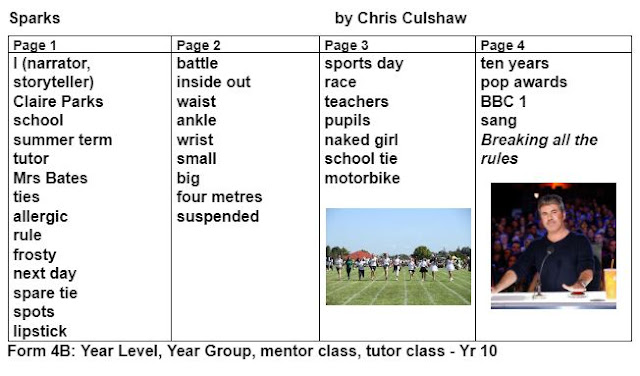Thursday 27 April 2023
Thursday 13 April 2023
Sparks Text 2
Sparks by Chris Culshaw Label the illustrations.
Sort the Keywords onto the vocabulary grid, think and then write a prediction.
Students are reminded to use the, Think Aloud and to then write an informed prediction.
The student above seems to have improved his scanning and prediction skills. I often tell the students I'm not going to mark their predictions but I insist they complete the task properly. I try to emphasise that it is important that they follow the steps modelled and that they warm up their brains before they attempt to read the text. I link this process to the courts or sports field. No one would consider playing a game without warming up their limbs with stretches or a light jog.
Students are not given the text until they have completed a prediction. Many students try to skip the task.
The process of determining importance in a text is a fundamental skill. I try to slip this task into a reading session explaining that in order to have a summary in your head or to write a summary it is important to tease out the main facts.
Students are asked to highlight the keywords as they read the text. The concept of using more than one reading speed is mentioned here. Students are asked to re-read the text and avoid treating the task as a treasure hunt.
T1
T2
It took some effort to convince the student above to highlight the keywords just once but he got there. Explaining that this skill is a powerful comprehension strategy helped. Often it helps to allocate a teacher-aid to work with a resistant student. This is often necessary until the student has mastered a particular strategy.
Another visual aid is used to help students make connections. This text reminds me of.....
This student had peer support but has progressed from a derivative summary judged at Level 3P to a Level 4A grade
The who, what, where, task has helped student G write a Level 4 summary. She has also responded to the prereading clip of The Casketeers and the question, what happens to you when you die.
At the other end of the spectrum, some students need help writing short concise summaries. The student below is still using quotes which I try to discourage.
 |
The interruptions to the timetable (floods, strikes) this term means I've been unable to work with this class as often as I normally would. The Curriculum and in this case Speeches always take precedence over basic reading skills. Hopefully next term, I'll be able to follow up with a few new strategies. I want the students to try using a flip book of keywords. Students will stand without the text and say their keyword summary to a partner using only the flip book. I'd also like to try using a Judged Group Writing or Summary Task. This is where students, in small groups, present a summary paragraph on portable whiteboards. These are all then given a grade out of 5 before the period ends. Generally, student motivation increases dramatically during this exercise.
Thursday 6 April 2023
Last week we looked at a text about the Blues. I also sat down and completed a PAT comprehension Test. After completing the test I was unable to tell if I'd answered the questions accurately, perhaps I didn't look hard enough. And because I'm not a Yr 9 or 10 student, I was unable to generate a Stanine. A feature of the test that became obvious right from the start was the need for the candidate to re-read the text each time they attempt to answer a question. This also applied to the text on The Blues. It's a good time to ask, do teachers consider this skill when presenting students with a text to read?
This is the reading comprehension results for a class who have been involved in the junior reading programme. Because of the disruptions this term and because of the curriculum demands on the teacher, these sessions were not held as often as I wanted. At this stage in the programme, students are still receiving a high level of teacher input.
Subscribe to:
Posts (Atom)

















